Abstract
We have analyzed the tyrosinase (TYR) gene in 38 unrelated patients with oculocutaneous albinism (OCA), derived from several different ethnic groups of the diverse population of Israel. We detected TYR gene mutations in 23 of the 34 patients with apparent type I (i.e., tyrosinase-deficient) OCA and in none of the patients with other clinical forms of albinism. Among Moroccan Jews with type IA (i.e., tyrosinase-negative) OCA, we detected a highly predominant mutant allele containing a missense substitution, Gly47Asp (G47D). This mutation occurs on the same haplotype as in patients from the Canary Islands and Puerto Rico, suggesting that the G47D mutation in these ethnically distinct populations may stem from a common origin.
Full text
PDF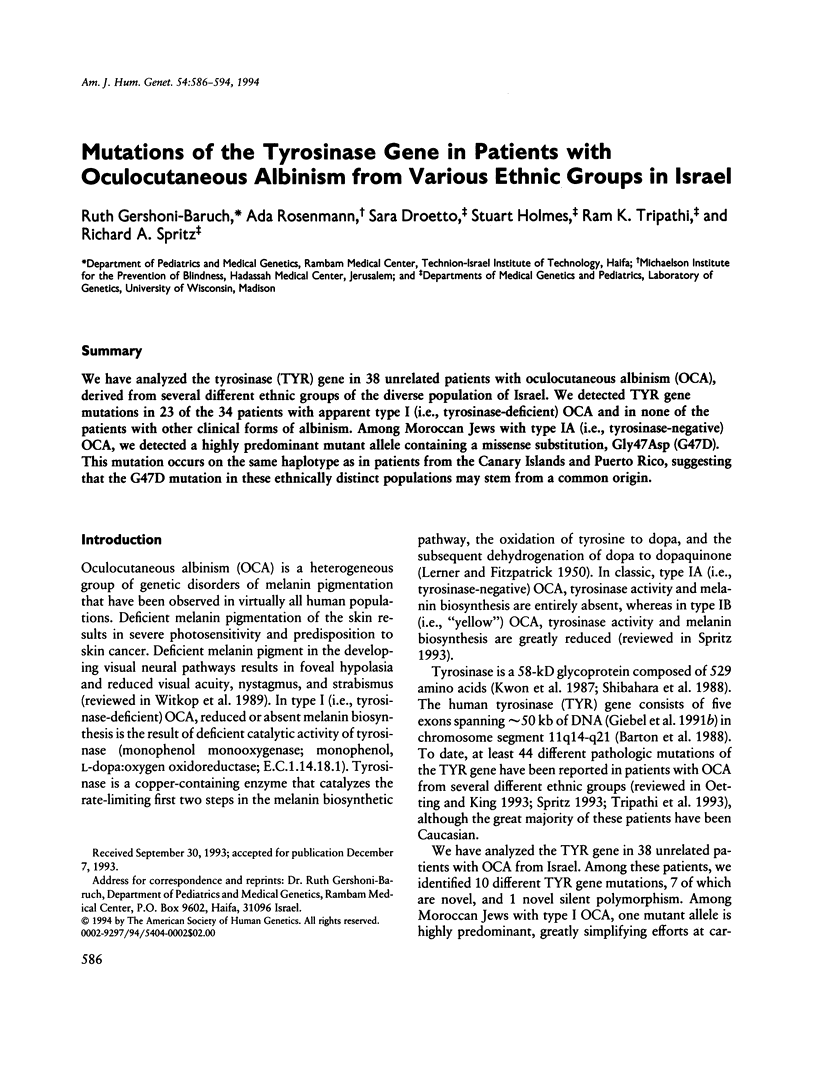
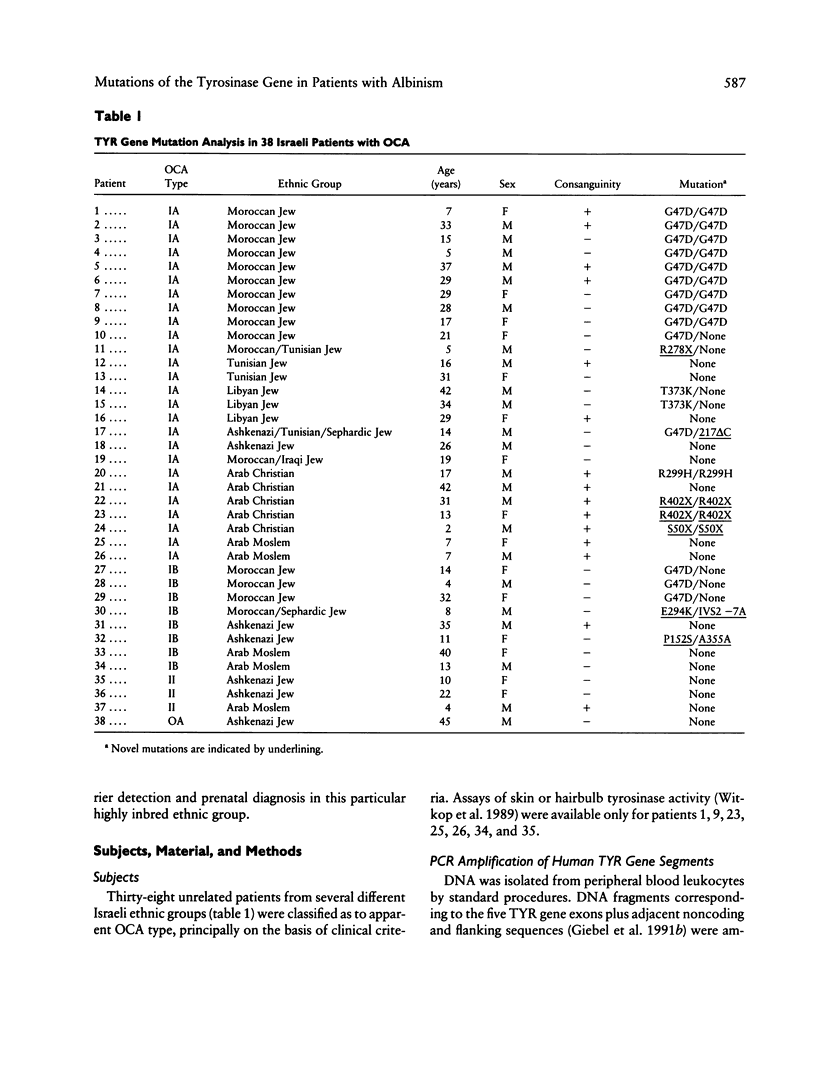
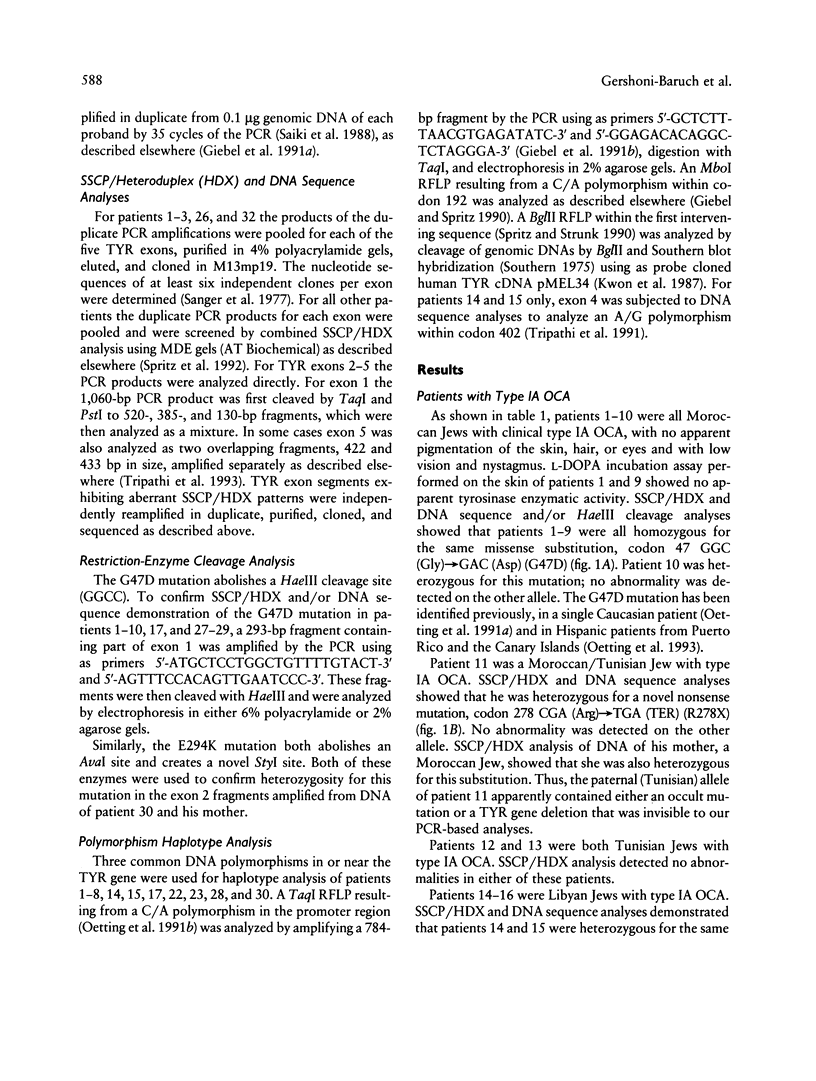
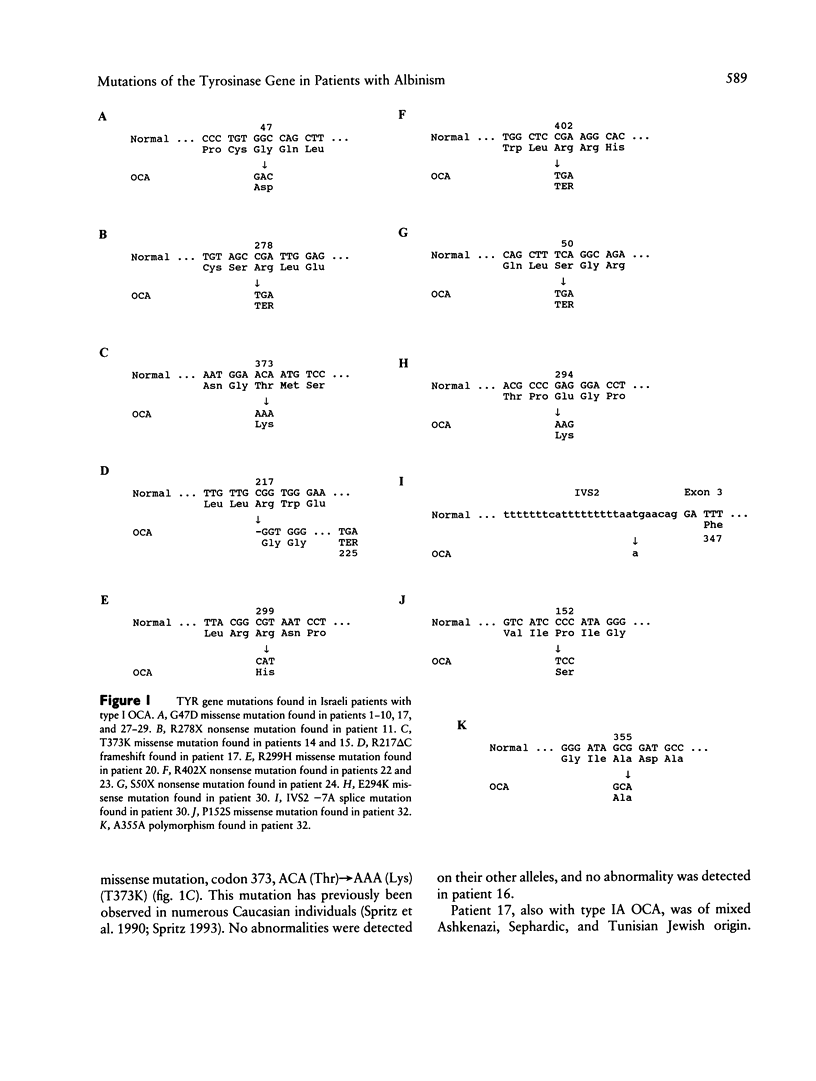
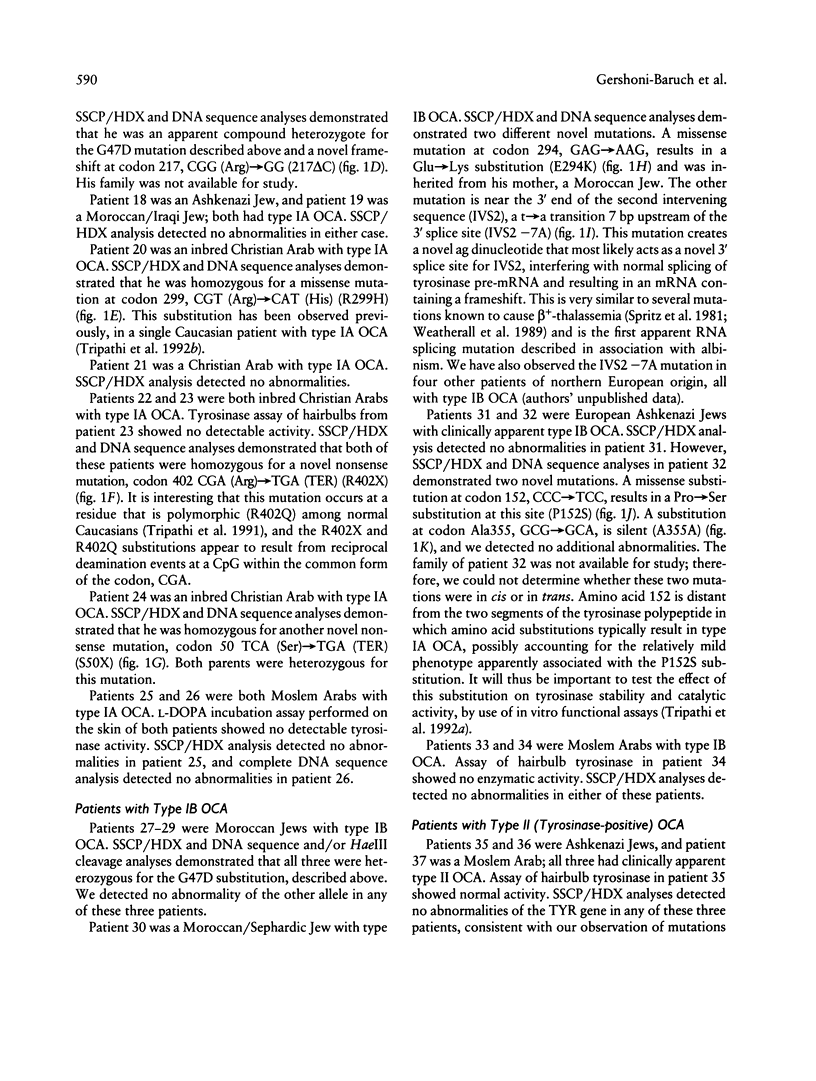
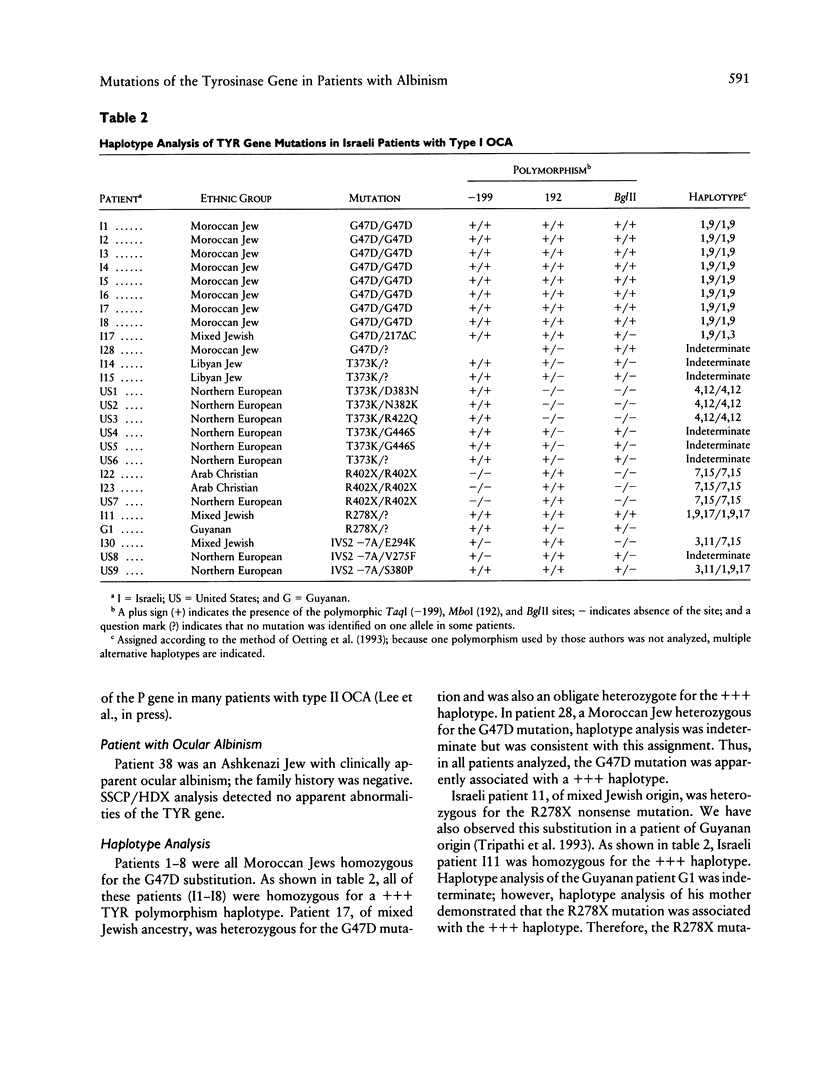
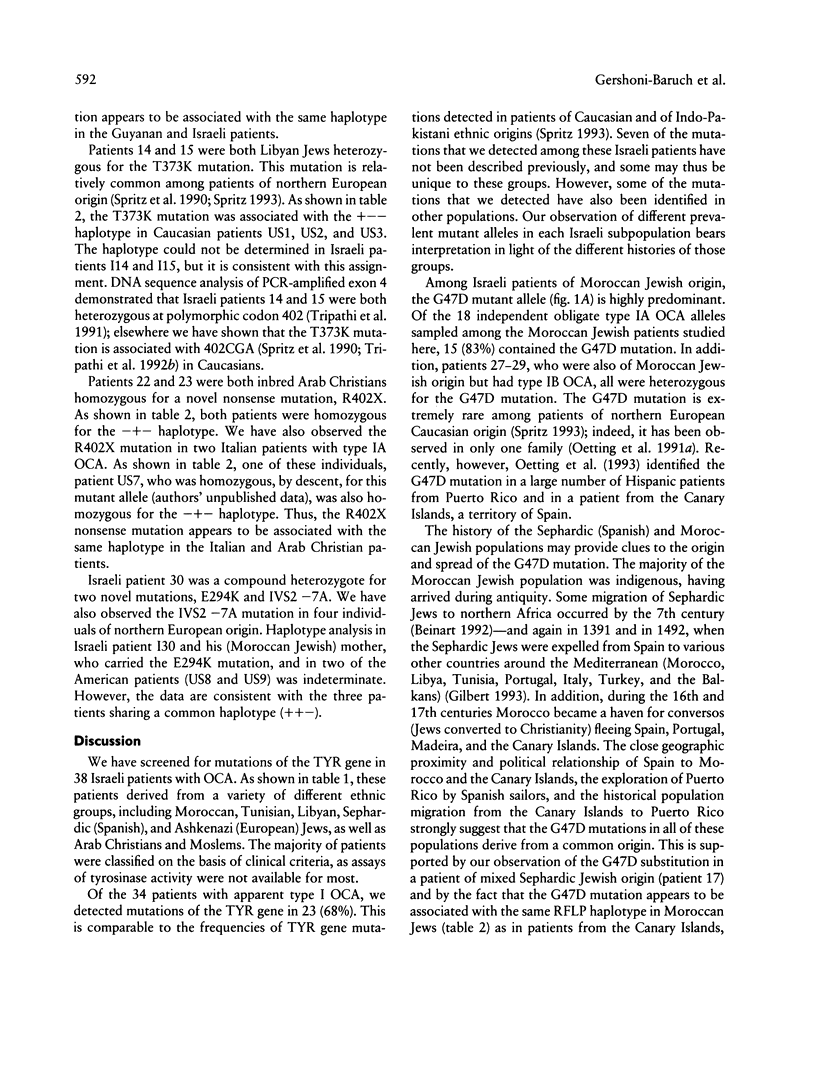
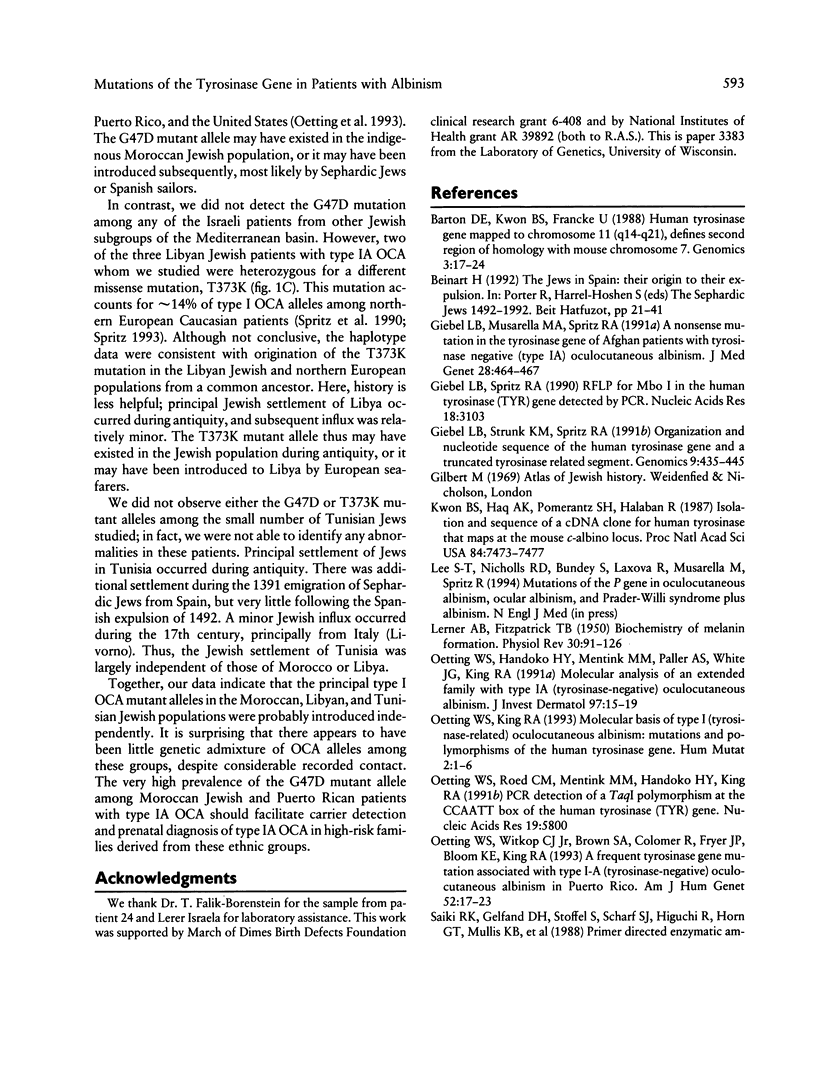
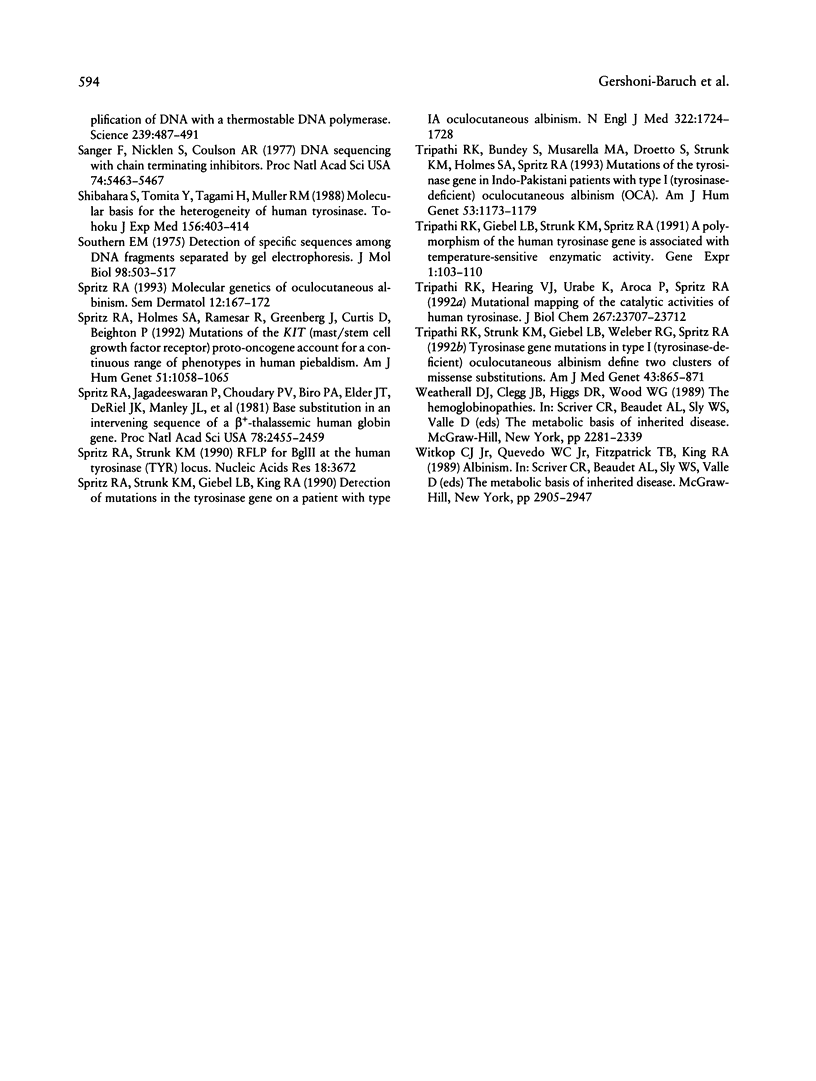
Selected References
These references are in PubMed. This may not be the complete list of references from this article.
- Barton D. E., Kwon B. S., Francke U. Human tyrosinase gene, mapped to chromosome 11 (q14----q21), defines second region of homology with mouse chromosome 7. Genomics. 1988 Jul;3(1):17–24. doi: 10.1016/0888-7543(88)90153-x. [DOI] [PubMed] [Google Scholar]
- Giebel L. B., Musarella M. A., Spritz R. A. A nonsense mutation in the tyrosinase gene of Afghan patients with tyrosinase negative (type IA) oculocutaneous albinism. J Med Genet. 1991 Jul;28(7):464–467. doi: 10.1136/jmg.28.7.464. [DOI] [PMC free article] [PubMed] [Google Scholar]
- Giebel L. B., Spritz R. A. RFLP for MboI in the human tyrosinase (TYR) gene detected by PCR. Nucleic Acids Res. 1990 May 25;18(10):3103–3103. doi: 10.1093/nar/18.10.3103-a. [DOI] [PMC free article] [PubMed] [Google Scholar]
- Giebel L. B., Strunk K. M., Spritz R. A. Organization and nucleotide sequences of the human tyrosinase gene and a truncated tyrosinase-related segment. Genomics. 1991 Mar;9(3):435–445. doi: 10.1016/0888-7543(91)90409-8. [DOI] [PubMed] [Google Scholar]
- Oetting W. S., Handoko H. Y., Mentink M. M., Paller A. S., White J. G., King R. A. Molecular analysis of an extended family with type IA (tyrosinase-negative) oculocutaneous albinism. J Invest Dermatol. 1991 Jul;97(1):15–19. doi: 10.1111/1523-1747.ep12477808. [DOI] [PubMed] [Google Scholar]
- Oetting W. S., King R. A. Molecular basis of type I (tyrosinase-related) oculocutaneous albinism: mutations and polymorphisms of the human tyrosinase gene. Hum Mutat. 1993;2(1):1–6. doi: 10.1002/humu.1380020102. [DOI] [PubMed] [Google Scholar]
- Oetting W. S., Roed C. M., Mentink M. M., King R. A. PCR detection of a TaqI polymorphism at the CCAATT box of the human tyrosinase (TYR) gene. Nucleic Acids Res. 1991 Oct 25;19(20):5800–5800. doi: 10.1093/nar/19.20.5800-a. [DOI] [PMC free article] [PubMed] [Google Scholar]
- Oetting W. S., Witkop C. J., Jr, Brown S. A., Colomer R., Fryer J. P., Bloom K. E., King R. A. A frequent tyrosinase gene mutation associated with type I-A (tyrosinase-negative) oculocutaneous albinism in Puerto Rico. Am J Hum Genet. 1993 Jan;52(1):17–23. [PMC free article] [PubMed] [Google Scholar]
- Saiki R. K., Gelfand D. H., Stoffel S., Scharf S. J., Higuchi R., Horn G. T., Mullis K. B., Erlich H. A. Primer-directed enzymatic amplification of DNA with a thermostable DNA polymerase. Science. 1988 Jan 29;239(4839):487–491. doi: 10.1126/science.2448875. [DOI] [PubMed] [Google Scholar]
- Sanger F., Nicklen S., Coulson A. R. DNA sequencing with chain-terminating inhibitors. Proc Natl Acad Sci U S A. 1977 Dec;74(12):5463–5467. doi: 10.1073/pnas.74.12.5463. [DOI] [PMC free article] [PubMed] [Google Scholar]
- Shibahara S., Tomita Y., Tagami H., Müller R. M., Cohen T. Molecular basis for the heterogeneity of human tyrosinase. Tohoku J Exp Med. 1988 Dec;156(4):403–414. doi: 10.1620/tjem.156.403. [DOI] [PubMed] [Google Scholar]
- Southern E. M. Detection of specific sequences among DNA fragments separated by gel electrophoresis. J Mol Biol. 1975 Nov 5;98(3):503–517. doi: 10.1016/s0022-2836(75)80083-0. [DOI] [PubMed] [Google Scholar]
- Spritz R. A., Holmes S. A., Ramesar R., Greenberg J., Curtis D., Beighton P. Mutations of the KIT (mast/stem cell growth factor receptor) proto-oncogene account for a continuous range of phenotypes in human piebaldism. Am J Hum Genet. 1992 Nov;51(5):1058–1065. [PMC free article] [PubMed] [Google Scholar]
- Spritz R. A., Jagadeeswaran P., Choudary P. V., Biro P. A., Elder J. T., deRiel J. K., Manley J. L., Gefter M. L., Forget B. G., Weissman S. M. Base substitution in an intervening sequence of a beta+-thalassemic human globin gene. Proc Natl Acad Sci U S A. 1981 Apr;78(4):2455–2459. doi: 10.1073/pnas.78.4.2455. [DOI] [PMC free article] [PubMed] [Google Scholar]
- Spritz R. A. Molecular genetics of oculocutaneous albinism. Semin Dermatol. 1993 Sep;12(3):167–172. [PubMed] [Google Scholar]
- Spritz R. A., Strunk K. M., Giebel L. B., King R. A. Detection of mutations in the tyrosinase gene in a patient with type IA oculocutaneous albinism. N Engl J Med. 1990 Jun 14;322(24):1724–1728. doi: 10.1056/NEJM199006143222407. [DOI] [PubMed] [Google Scholar]
- Spritz R. A., Strunk K. M. RFLP for BgIII at the human tyrosinase (TYR) locus. Nucleic Acids Res. 1990 Jun 25;18(12):3672–3672. doi: 10.1093/nar/18.12.3672-a. [DOI] [PMC free article] [PubMed] [Google Scholar]
- Tripathi R. K., Bundey S., Musarella M. A., Droetto S., Strunk K. M., Holmes S. A., Spritz R. A. Mutations of the tyrosinase gene in Indo-Pakistani patients with type I (tyrosinase-deficient) oculocutaneous albinism (OCA). Am J Hum Genet. 1993 Dec;53(6):1173–1179. [PMC free article] [PubMed] [Google Scholar]
- Tripathi R. K., Giebel L. B., Strunk K. M., Spritz R. A. A polymorphism of the human tyrosinase gene is associated with temperature-sensitive enzymatic activity. Gene Expr. 1991 May;1(2):103–110. [PMC free article] [PubMed] [Google Scholar]
- Tripathi R. K., Hearing V. J., Urabe K., Aroca P., Spritz R. A. Mutational mapping of the catalytic activities of human tyrosinase. J Biol Chem. 1992 Nov 25;267(33):23707–23712. [PubMed] [Google Scholar]
- Tripathi R. K., Strunk K. M., Giebel L. B., Weleber R. G., Spritz R. A. Tyrosinase gene mutations in type I (tyrosinase-deficient) oculocutaneous albinism define two clusters of missense substitutions. Am J Med Genet. 1992 Jul 15;43(5):865–871. doi: 10.1002/ajmg.1320430523. [DOI] [PubMed] [Google Scholar]


